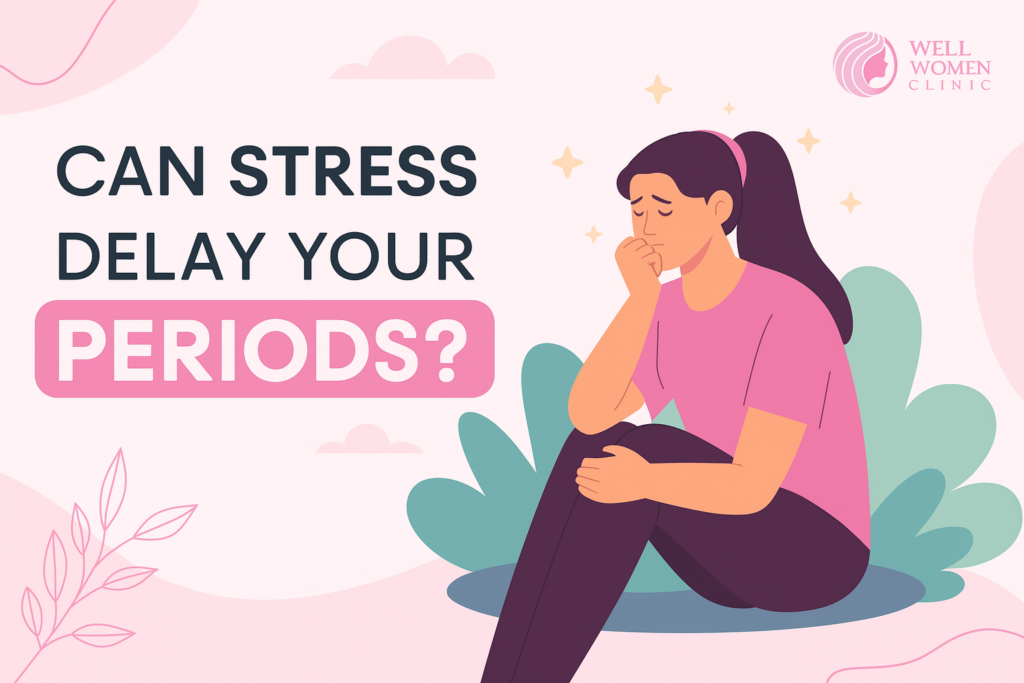Discover how stress can impact your menstrual cycle, delay periods, and signal deeper hormonal or psychological health issues.
For many women, the menstrual cycle is a reliable monthly rhythm — until it suddenly isn’t. If you’ve ever stared at the calendar, puzzled by a late period despite no changes in lifestyle, contraception, or sexual activity, you’re not alone. One unexpected factor that often flies under the radar? Stress. Yes, your mind and body are far more connected than you might think, and a stress delayed period is a real and recognized phenomenon.
But how exactly does stress disrupt your menstrual cycle? And at what point should you be concerned? Let’s dive into the science, the symptoms, and what your body might be trying to tell you.
Understanding the Menstrual Cycle: A Delicate Balance
To grasp how stress interferes with your period, it helps to understand how your cycle works. The menstrual cycle is governed by a complex hormonal symphony involving the brain, ovaries, and uterus. Key players like oestrogen, progesterone, luteinizing hormone (LH), and follicle-stimulating hormone (FSH) regulate ovulation and menstruation.
When these hormones fall out of sync, your cycle can become irregular. One of the biggest disruptors of this hormonal flow? Stress.
How Stress Affects Your Hormones
Stress — whether physical, emotional, or psychological — activates your body’s hypothalamic-pituitary-adrenal (HPA) axis, a system that controls your response to stress. When you’re under chronic pressure, your brain signals your adrenal glands to release cortisol, the primary stress hormone.
High cortisol levels can suppress the functioning of the hypothalamus, the command centre of your brain that also governs reproductive hormones. This disruption can delay or even prevent ovulation, resulting in a stress delayed period.
In severe cases, long-term stress may lead to hypothalamic amenorrhea — a condition where periods stop altogether due to chronic stress or significant weight changes.
The Psychological Health Connection
Your mental well-being plays a crucial role in menstrual health. Anxiety, depression, and emotional upheaval can all contribute to a late or missed period. Women dealing with intense work pressure, relationship troubles, grief, or trauma often experience irregular cycles without any underlying physical condition.
This is why psychological health isn’t just a mental issue — it has direct implications for your physical and reproductive health. The mind-body connection is powerful, and menstruation is one of the most visible reflections of this dynamic.
Stress or Something More? When to Dig Deeper
While an occasional missed or delayed period due to stress isn’t typically cause for alarm, it becomes more concerning when irregularities become chronic. Sometimes, stress might be masking deeper conditions like hormonal imbalance or PCOS (Polycystic Ovary Syndrome).
Women with PCOS symptoms — such as acne, excessive hair growth, weight gain, and missed periods — may already have an irregular cycle. Add chronic stress to the mix, and the symptoms can worsen significantly.
In fact, stress can both mimic and exacerbate conditions like PCOS. It’s a vicious cycle: PCOS symptoms increase emotional distress, and emotional distress worsens hormonal fluctuations. That’s why it’s important not to self-diagnose and instead consult a healthcare professional who can differentiate between stress-related delays and medical conditions.
How to Know if Stress Is the Culprit
Here are some signs that stress might be delaying your period (learn more about how late a period can be due to stress)
- Your cycle was regular before a major life event or change
- You’re experiencing sleep disturbances, irritability, or fatigue
- You’re under emotional, financial, academic, or relationship pressure
- You’re not showing signs of pregnancy, PCOS, or other medical issues
- You’ve had a recent change in diet, travel, or exercise routines
Remember, stress isn’t always loud. Sometimes it creeps in subtly — in the form of burnout, emotional suppression, or prolonged anxiety.
Managing Stress for Menstrual Health
The good news? Once the stressor is removed or managed, your cycle often returns to normal. Here are some strategies that may help:
1. Mindfulness and Meditation
Just 10–15 minutes a day can help lower cortisol levels. Apps like Headspace or Calm make it easy to build a habit.
2. Movement — But Don’t Overdo It
Exercise reduces stress, but excessive workouts can increase cortisol. Opt for gentle movement like yoga, walking, or dancing.
3. Balanced Diet
Avoid crash diets or restrictive eating, which can stress the body. Focus on nourishing foods rich in magnesium, B-vitamins, and healthy fats.
4. Sleep Hygiene
Aim for 7–9 hours of sleep. Consistent sleep-wake cycles help regulate hormones and stabilize mood.
5. Journaling or Therapy
Expressing your emotions — either through writing or talking to a therapist — can release mental clutter and provide clarity.
6. Limit Stimulants
Cutting down on caffeine and alcohol may reduce anxiety levels, helping restore hormonal balance.
When to Seek Help
If your period is consistently late or absent for more than three months (and you’re not pregnant), it’s time to consult a healthcare provider. You may need a hormonal imbalance screening, thyroid test, or an evaluation for PCOS symptoms, which can sometimes begin as early as the teenage years.
Likewise, if stress is becoming unmanageable and affecting other areas of your life — sleep, appetite, energy — it’s wise to talk to a mental health professional. Sometimes, tackling emotional stress can fix physical issues like irregular periods without the need for medication.
Final Thoughts
Your menstrual cycle is more than just a biological clock — it’s a messenger. A delayed period can be your body’s way of saying, “I’m overwhelmed.” Whether it’s work stress, emotional burnout, or psychological pressure, listening to your body is the first step toward restoring balance.
One or two late periods might not mean much, but if the pattern continues, it’s worth exploring deeper. Your cycle is a window into your overall well-being — physical, hormonal, and emotional.
If you’re looking for expert, personalized care for irregular cycles, hormonal issues, or mental wellness support, Well Women Clinic, a gynaecologist specialist in london offers compassionate, comprehensive healthcare tailored to your needs. From diagnosing hormonal imbalance to addressing PCOS symptoms, their team is dedicated to helping you understand and improve your health — one cycle at a time.





